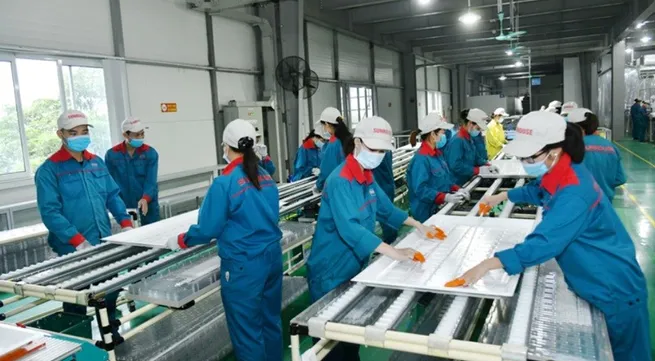Prompt policies needed to support the development of large private enterprises

As of December 31, 2021, Vietnam has 694,200 domestic private enterprises, accounting for 96.6% of the total number of operating enterprises, and employing 58.1% of the total workers. Their assets and net revenue made up 59.3% and 57.8% of the total for all enterprises in Vietnam, respectively.
A notable finding of the VPE500 Report is that during the COVID-19 pandemic, the resilience of large-scale enterprises is better than that of small and medium-sized enterprises, which is shown in the fact that enterprises listed in VPE500 are still capable of pouring investment in expanding production and business assets in such difficult context.
The VPE500 group has also been operating outstandingly and still maintains a good growth rate compared to domestic private enterprises in general.
Deputy Director of the Vietnam Institute of Development Strategies Nguyen Quoc Truong reported that although VPE500 accounted for only 0.075% of the total number of domestic private enterprises between 2019 and 2021, they created 12% of total jobs in the domestic private sector.
VPE500’s assets accounted for 28% of total and generated 18.4% of the gross revenue of domestic private enterprises. Its contribution to the state budget accounted for 18.4% of the total for all domestic private enterprises.
Therefore, the VPE 500 group is expected to be a leading and influential force in the business market. Their business performance and competitiveness are decisive in strategic issues such as technological innovation, participation in global value chains, and environmental protection.
This is also the leading group of enterprises in research, development and automation activities compared to state-owned enterprises and foreign-invested enterprises.
According to Dr. Nguyen Toan Thang, head of VIDS’s International Relations Department and member of the VPE500-2023 research team, the VPE500 is formed based on the infrastructure, resources, and market advantages of localities. A majority of the VPE500 are operating in the manufacturing, processing, trade, and construction industries.
However, he pointed out that Vietnam has not yet seen many private enterprises with regional influence, and Vietnamese brands are still worth less than those from other Southeast Asian countries.
Changing policy approaches
Enterprises operating in real estate, construction, commerce, garment, and food processing which were heavily hit by COVID-19 are out of this year’s VPE500.
The research team proposed that the Government need to change its approach in supporting and developing private enterprises by promulgating specific policies on large private corporations.
Dr. Tran Toan Thang said that the lesson was learned from China, Japan, and the Republic of Korea. In the early stages of industrialisation and modernisation, these countries have had special policies to support the formation of powerful private economic corporations, which created the “backbone” for their economies.
In Vietnam, most of private enterprises are established after Doi Moi (Renewal) process. The State's support for this group needs to be substantive and strong enough to promote the establishment of large-scale enterprises
In addition, more specific policies are needed to build a force of large, stable private enterprises that can withstand major external shocks and increase the efficiency of the entire economy.
In the context when businesses are facing many difficulties after the COVID-19 pandemic, the research team agreed that policies for businesses in the coming time should not only facilitate businesses in entering the market but also support them to survive and grow. In particular, large enterprises should be encouraged to make more investment to improve productivity and gradually shift to in-depth growth.
At the same time, it is necessary to design economic policies to promote business linkages, encouraging large enterprises, State-owned enterprises, and foreign-invested ones to form joint ventures and link with domestic small- and medium-sized enterprises.
Localities need to create favourable conditions to encourage the building of leading private enterprises based on the local advantages.
A 1% increase in VPE500 investment boosts domestic private enterprise investments by 0.45% in the initial year and a further 0.26% in the following year.
Each 1% increase in investment of the VPE500 group increases investment by domestic private enterprises by 0.45% in the first year and by 0.26% the following year. This figure shows that investments by larger private companies stimulate investment demand from smaller private enterprises, who act as suppliers or satellite firms to the VPE500.
Tags:





